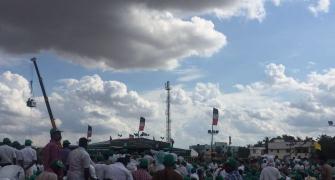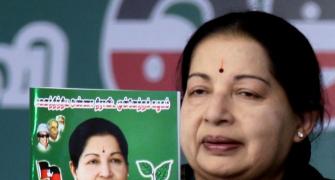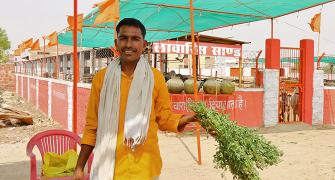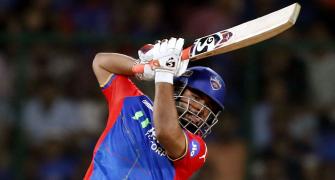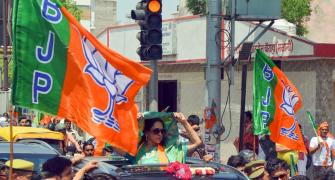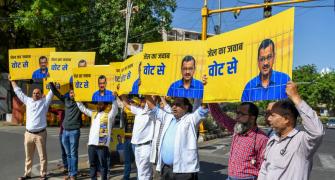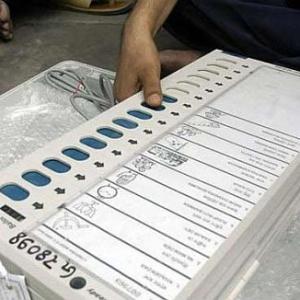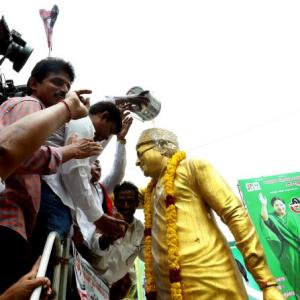In writing to the government for a change in the law, the Election Commission has actually acknowledged the future possibility of countermanding polls to curb the use of money power, says N Sathiyamoorthy.

Has the Election Commission shot itself in the foot?
The question arises in the light of the EC countermanding polls in two constituencies -- Aravakurichi and Thanjavur -- in the recent elections to the Tamil Nadu legislative assembly. The EC sought specific powers to postpone or revoke the polls, citing ‘cash-for-vote’.
According to news reports, the commission has written to the Union law ministry, seeking a new Section 58(b), in the Representation of the People Act, to empower the EC to provide for adjournment or countermanding of elections in the affected polling areas. It said that money power was used to influence the polls and asked for the polls to be re-scheduled.
At present, the Act provides for countermanding only in the case of booth-capturing, under Section 58(a). In seeking to insert a new sub-section 58(b), the EC has also sought a clarification that the phrase 'countermand the election' in both cases should mean ab initio (from the beginning) rescinding of the entire electoral process in the constituency.
In writing to the government for a change in the law, the EC has actually acknowledged future possibilities of such countermanding of polls to curb the use of money power.
However, the polls were conducted under Article 324 of the Constitution, which empowers the EC to ensure free and fair polls, and read with Section 54(a), it means that money power was booth-capturing of a different kind which anyway interfered with ‘free and fair polls’.
It is quite unlikely that the candidates of the ruling All India Anna Dravida Munnetra Kazhagam and the rival DMK might want to contest the poll panel’s decision to cancel the vote in the two constituencies. The party leaderships would not possibly want their candidates to show themselves in a bad light, should the higher judiciary pass strictures either against the candidates or the party, or both.
It remains to be seen if any ‘affected voter’ in either of these constituencies moves the higher judiciary, seeking a declaration that the EC had acted beyond the powers conferred on it, both in terms of ensuring free and fair polls and countermanding of polls.
Already, the Madras high court has disposed of a petition seeking re-polling earlier than June 13 as fixed by the EC, after polling for the remaining 232 constituencies ended on May 16. Originally, the EC had fixed the date for May 23. The petitioners in the HC and political parties, wanted it brought ahead to any day before the counting of votes on May 19 for the remaining 232 seats. They argued that re-polling after the results could ‘unfairly influence’ the voters in these two constituencies.
The HC then asked the EC for its position, which fixed the re-polls then June 13. Subsequently, it cancelled the countermanded polls in their entirety.
In between, Tamil Nadu Governor K Rosaiah too got into the act and in an unprecedented move summoned state chief electoral officer Rajesh Lakhoni for a briefing.
He also wrote to the CEO, citing representations (including those from AIADMK candidates), asking for the postponed polling to be held on June 1, to help the people’s representatives from the two constituencies participate in the Rajya Sabha polls.
Then, the EC after a sitting in Delhi issued a statement signed by Chief Election Commissioner Nasim Zaidi and the two ECs taking exception to the governor’s well-publicised suggestion. Later, the EC cancelled the polls.
Under the law and practice of the land, the Executive has no say in the specific conduct of polls. Even the Judiciary has refused to interfere with the poll process until after the results had been declared. This is also to ensure that there is no indefinite ‘judicial stay’ of polls, on one ground or another.
Much less is the power of the Executive in the actual conduct of the polls. As per the Constitution, general practice and court precedents, the President/governor only issues the formal notifications for the elections concerned -- and later the constitution of the new Lok Sabha or the state assembly, as the case may be.
Governor Rosaiah’s term ends in September, and it remains to be seen if the Centre would recommend an extension for him in the light of the EC’s observations.
Rosaiah is a Congress veteran from neighbouring Andhra Pradesh, and was also the chief minister of the state, before becoming TN governor. He is also the only governor to be allowed to stay on in office after the change of guard at the Centre.
Around poll time, the governor also possibly set another precedent of sorts by initiating a defamation case against the state Congress president, E V K S Elangovan.
It is definitely a precedent for the governor to file a case after the Supreme Court upheld the existing provisions on ‘criminal defamation’ -- as different from ‘civil defamation’, entailing damages.
It is now anybody’s guess if Chief Minister J Jayalalithaa will discuss the appointment of a new governor when she makes her first visit to Delhi after her historic poll victory on June 14. Jaya is scheduled to meet with Prime Minister Narendra Modi, possibly at his residence. While she is in Delhi, other senior ministers at the Centre have made it a habit of calling on her at her residence in the national capital to discuss state-related issues. A million-dollar question is whether Jaya will meet with the national media, which has never been granted an interview with her since the poll results. The media might possibly want to grill Jaya on the ‘disproportionate assets case’ against her after the Supreme Court had reserved the verdict only days before her upcoming Delhi visit.
Towards the concluding sessions of the hearing in the case, the two-judge SC Bench had thrown up an interesting proposition/question at the prosecution (represented by lawyers for the state of Karnataka).
Going by reports in a section of the media, the judges proposed to the prosecution that making money beyond the known sources of income was itself not an offence under the Prevention of Corruption Act (PCA). It also needed to be proved that the money was made through illegal means.
Such a construct, if taken to its logical conclusion in the final verdict, whenever pronounced, could set a new precedent in the nation’s ‘graft jurisprudence’.
The law at present says that the accused need to prove the source of income, if the prosecution/court is convinced that the wealth in his/her possession is ‘disproportionate to his/her known sources of income’.
It thus becomes incumbent upon the accused to show the sources of income, as also convince the court that those sources did not attract the provisions of the PCA.
The law also holds that any ‘public servant’ or anyone deemed close to a public servant could be hauled up under the PCA.
It’s then for the co-accused of the ‘public servant’ – in this case, Jaya’s confidante Sasikala and the latter’s two relatives – to prove that they are not linked. This is again a point on which the defence has challenged the prosecution.
The SC has to clarify the position in these matters and others, after a single judge of the Karnataka high court had upturned the conviction order pronounced by the trial court and ordered the release of all four accused.
It’s another matter altogether that during the course of the arguments, the Bench also added to the list of possible verdicts, the choice of presenting the case to the high court for a fresh hearing.
N Sathiya Moorthy, veteran journalist and political analyst, is Director, Observer Research Foundation, Chennai Chapter.

